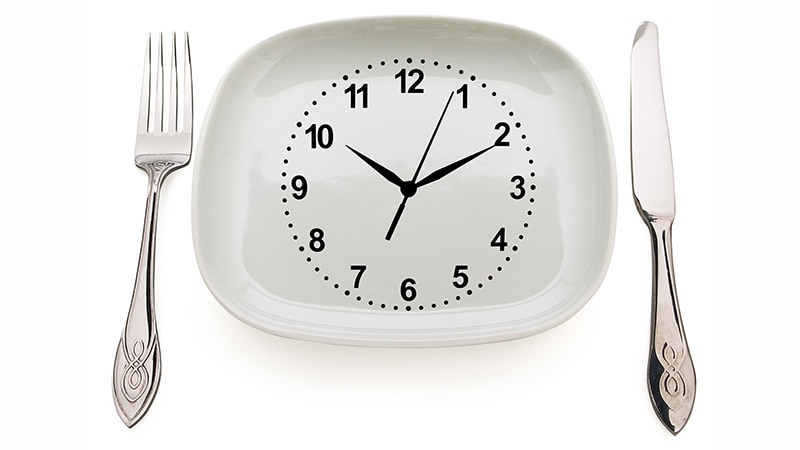
Adults with obesity had similar weight loss and improvements in some cardiometabolic markers after restricting their eating to 4 or 6 hours a day for 2 months, in a new study.
"These findings suggest that this form of severe [time-restricted feeding] is achievable and can help adults with obesity lose weight, without having to count calories," according to Sofia Cienfuegos, a PhD student at the University of Illinois at Chicago, and colleagues, whose work was published online July 15 in Cell Metabolism.
"Until we have further studies that directly compare the two diets or seek to study the optimal time for fasting, these results suggest that the 6-hour [time-restricted feeding] might make sense for most people who want to pursue a daily fasting diet," said senior author Krista A. Varady, PhD, a professor of nutrition at the same university.
The researchers hypothesized that the stricter regimen (4 hours) would lead to greater weight loss and drop in blood pressure as well as better glycemic control and levels of an oxidative stress marker.
However, participants in both time-restricted feeding groups consumed about 550 fewer calories per day than participants in the control group, and at 2 months they had similar weight loss and other outcomes.
The results "are promising and reinforce what we've seen in other studies — fasting diets are a viable option for people who want to lose weight, especially for people who do not want to count calories or find other diets to be fatiguing," Varady said in a statement.
“It's also telling that there was no added weight loss benefit for people who sustained a longer [20-hour] fast" versus a shorter 18-hour fast, she noted.
Warrior Diet vs 18:6 Diet vs Control
Three types of intermittent-fasting regimens have become popular in recent years, which can "produce clinically significant weight loss and confer protection against metabolic diseases," the authors write by way of background.
Alternate day fasting consists of eating ad libitum (as much as desired) on "feast days" and then fasting the following day and repeating this, they explain. The 5:2 diet involves fasting 2 days a week and eating normally for 5 days.
The current study compared two types of another type of intermittent fasting, time-restricted feeding, which entails only eating during 4 hours (the warrior diet) or 6 hours (the 18:6 diet) and fasting the rest of the day.
It is not clear if skipping breakfast is bad for weight management, and patients might be more compliant with an eating regimen if they can eat during usual family dinner times, the researchers note.
Therefore, they compared afternoon/early evening restricted feeding from 1 to 7 PM (6 hours) or from 3 to 7 PM (4 hours).
They randomized 58 individuals who were 18-65 years old with obesity (body mass index [BMI], 30-49.9 kg/m2) who had stable weight and were sedentary or only moderately active but did not have type 2 diabetes.
On average, participants were 47 years old, had a BMI of 37 kg/m2, and weighed 100 kg (220 lbs); most were women (90%) and about 66% were Black.
Participants were randomized to 4-hour time-restricted feeding (19 participants), 6-hour time-restricted feeding (20), or a control (19) group.
After a 2-week weight-stabilization period (where participants were instructed to maintain the same diet, physical activity level, and weight), they entered the 8-week intervention.
Participants in the time-restricted feeding groups were allowed to eat any foods, in any amounts, without counting calories during feeding hours, and were encouraged to drink lots of water. Black tea, coffee, or diet soda were also allowed during fasting hours.
Participants in the control group did not receive dietary advice but were instructed to keep the same eating and physical activity habits to stay the same weight.
Trials Needed on Long-Term Feasibility of Time-Restricted Feeding
At 8 weeks, participants in the time-restricted feeding groups lost on average 3.2% of their initial weight while those in the control group lost 0.1% of their starting weight.
Participants in the two time-restricted feeding regimens had similar reductions in fasting insulin, insulin resistance, and the oxidative stress marker 8-isoprostane, but adopting these two regimens did not have any effect on blood pressure, LDL-cholesterol, HDL-cholesterol, or triglycerides.
No serious adverse events were reported.
Participants in the restricted feeding groups had mild adverse events (dizziness, nausea, headaches, and diarrhea) that peaked at week 2 and then disappeared by week 3 and did not recur.
The drop-out rate was lower in the 6-hour time-restricted feeding group (1 in 20 participants; 5%) than in the 4-hour time-restricted feeding group (3 in 19 participants; 16%) or control group (5 of 19 participants; 26%).
Most people discontinued the study because of scheduling conflicts, and importantly, no one dropped out because they disliked the time-restricted feeding intervention, the researchers point out.
They acknowledge that this was a small study, and it evaluated restricted feeding later in the day, whereas insulin sensitivity has been purported to be higher in the morning. Also, participants did not lose a clinically meaningful 5% of their initial weight.
"Though these findings are promising, future trials will be needed to examine the feasibility of [time-restricted feeding] long-term and also examine whether the weight loss and cardiometabolic benefits observed here can be sustained over longer periods of time," the researchers conclude.
The study was supported by the National Institutes of Health. Varady has reported receiving author fees from the Hachette Book Group for the book The Every-Other-Day Diet. The other authors have reported no relevant financial relationships.
Cell Metab. Published online July 15, 2020. Abstract
For more diabetes and endocrinology news, follow us on Twitter and Facebook.
"lose" - Google News
July 24, 2020 at 10:17PM
https://ift.tt/32PpkAL
Time-Restricted Feeding a 'Viable Option' to Lose Weight - Medscape
"lose" - Google News
https://ift.tt/3fa3ADu https://ift.tt/2VWImBB
Bagikan Berita Ini














0 Response to "Time-Restricted Feeding a 'Viable Option' to Lose Weight - Medscape"
Post a Comment